Sunday, 28/04/2024 | 12:08 GMT+7
2009 statistics from Ministry of Industry and Trade show
that

Mr. Dang Vu Minh, Chairman of Committee for Science,
Technology and Environment of
National Assembly: Law on energy efficiency is
necessary and suitable both in the current
circumstances and in the future.
Despite depletion of energy sources resulting in increasing power shortage, energy use in Vietnam is still inefficient and wasteful due to outdated technology and limited awareness of energy saving. Such scenario has made the issue of using energy efficiently become highly imperative.
To encourage energy saving, Ministry of Industry and Trade has spent the last two years drafting the Law on energy efficiency and conservation, which was approved by 12th National Assembly on June 17th 2010.
Great efficiency from the energy saving
Shortage of initial capital, limited awareness among business managers and lack of reliable consultants are the biggest obstacles in implementing efficient energy usage and renovating technology.
Most businesses know about long term benefit from energy efficiency, but the cost of investing on energy efficient technology is still too high, especially at the moment when financial supports from government’s supporting programs are very limited. Using outdated equipments with low productivity and high energy consumption is the major cause of power waste.
However, there are cases when enterprises determine to update their equipments to save energy and have enjoyed substantial economic benefit, protect the environment and improve community’s awareness.
The goal of 8% energy saved proposed in “Researching plan
for using energy efficiently in
Forming an official law
After a long and hard time researching and analyzing energy
usage in

With 85.8% of agreed on the total number of
MPs
(98.37% of the total 430 present reps),
on June 17th, Congress passed
the Law.
The framework was then re-evaluated by experts, scientists, entrepreneurs and citizens in many workshops. Necessary modifications were added to form a Final Draft Law to present in the 6th meeting of 12th National Assembly. In the following meeting, the Law was approved with 12 Chapters, 48 Articles.
Importance of Energy efficiency labeling
The Law requires labeling products using energy efficient technology to encourage production of these products and gradually eliminate outdated equipment, reducing energy consumption in production. Such requirement is mandatory in an energy efficiency program, a key to the program’s success, improving performance of household electrical appliances up 2 – 3 times.
Labels will not only make it easier for customers to choose
electrical appliances but also form a technical barrier against obsolete
equipment with low energy efficiency. Product labeling has been very successful
in many countries and regions, especially in the

Professionally implementing energy
efficiency program,
Hanosimex has save
approximately 5 -7 billion dong a year.
Mr. Nguyen Dinh Hiep, Head of Energy Efficiency Office
(Ministry of Industry and Trade) said, energy labeling will be made mandatory
in the future for some facilities and equipment with high energy consumption,
starting from civil appliances such as lighting, fans, air-cons, refrigerators,
power engines. Also, Energy efficiency labeling in
Voluntary labeling of electronic appliances should be made before July 1st 2011. From then on labeling on these products will be made mandatory.
Industrial equipment (electric motors, small and medium-sized boilers, three-phase transformers, etc) should be labeled by January 1st, 2012; materials and accessories including insulation, glass, windows, roofing, sheet materials January 1st 2015.
The whole community should lend a hand
The implementation of the law will face certain difficulties due to its complexity and high technical specialization. Complementing the law, Decree on requirement details and implementation guides, and Decree of administrative violation sanctions have been drafted.

Technicians instructs representative of Women Organization in Ninh Binh how to use Biogas.
More detailed documents such as the circular of standards and norms for energy use in different fields are still needed.
In the implementing of the Law, there should be close coordination between the related ministries such as Ministry of Industry and Trade, Ministry of Science and Technology, Ministry of Construction, Ministry of Transport, Ministry of Information Communication, deployment of all the energy saving scheme within the framework of the national objectives program.
By Nguyen An
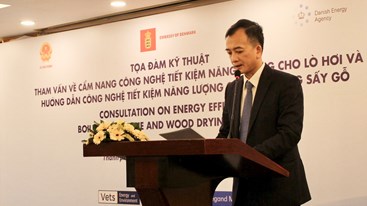
.png?w=367&h=206&mode=crop)
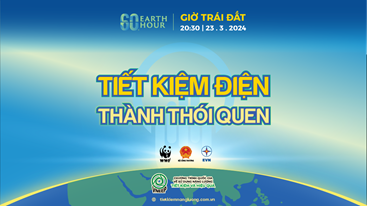
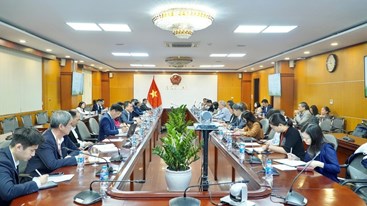
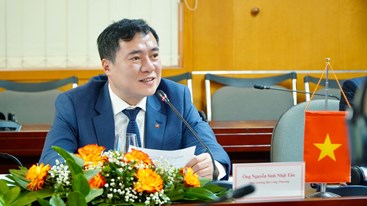



.jpg?w=367&h=206&mode=crop) Energy efficiency and conservation usage is an important aspect of the national energy development strategy
05/03/2024
Energy efficiency and conservation usage is an important aspect of the national energy development strategy
05/03/2024
 Challenges and Opportunities to promote energy efficiency market in Vietnam
Challenges and Opportunities to promote energy efficiency market in Vietnam
 The Ministry of Industry and Trade requests government agencies to coordinate in organizing Earth Hour 2024
The Ministry of Industry and Trade requests government agencies to coordinate in organizing Earth Hour 2024
 Consultation on Energy Efficiency Boiler Catalogue and Wood Drying Guideline
Consultation on Energy Efficiency Boiler Catalogue and Wood Drying Guideline
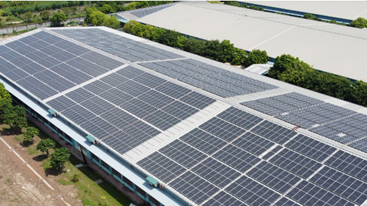 Son Ha Co., Ltd, applies energy efficiency and conservation measures
Son Ha Co., Ltd, applies energy efficiency and conservation measures
.png?w=367&h=206&mode=crop) Request for expression of interest - C2.1.13: Capacity Building on energy efficiency policies development
Request for expression of interest - C2.1.13: Capacity Building on energy efficiency policies development
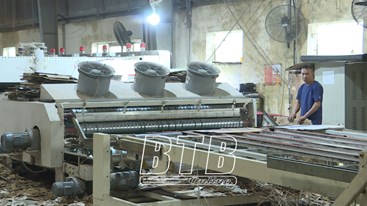 Phuc Kien Co., Ltd., is effectively implementing energy-saving measures
Phuc Kien Co., Ltd., is effectively implementing energy-saving measures
 Request for expression of interest - C2.1.12: Independent monitoring of safeguards implementation
Request for expression of interest - C2.1.12: Independent monitoring of safeguards implementation